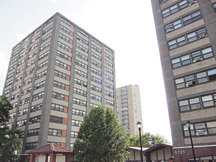Six months after some residents complained about bedbug infestations in buildings operated by the North Bergen Housing Authority, residents are divided about whether the problem still exists. Some insist the pests haven’t been eradicated, others claim there is no problem, and some say they don’t want to talk about it for fear of eviction.
A proposed state law might provide some relief, as it would force landlords to take responsibility for a bedbug problem or face heavy fines. The legislation was passed the Assembly in May but awaits consideration by the Senate.
Bedbugs, or cimicidae, are tiny insects that infest beds and feed on human blood. They spread quickly since they can go without food, can reproduce 500 times in a lifetime, and can remain dormant for up to 18 months. They dwell in clothing, bedding and furniture, and are easily spread by people traveling.
In September, 2009 the problem was first reported in the Cullum, a 308-unit North Bergen senior housing building. Soon after, the Reporter received several anonymous complaints that the problem had also spread to nearby Lawler Towers, two 13-story twin towers designated for seniors.
A daughter said she was afraid her mother would transport the bugs if she visited her home.
________
“She is wanting to stay anonymous because she is scared that they will throw her out of the apartment,” she said earlier this month. “She cannot afford extermination [or] getting rid of furniture and mattresses due to high cost. She is also concerned that if she does exterminate, since the infestation is in the building, it will just re-occur, at her expense. This is a very big problem.”
The daughter said she is afraid her mother will transport the bugs if she visits her home. She does not want her children bitten by the bugs. But what most worries her, she said, is that everyone in the building is afraid to talk.
“When I visited the lobby area, I was instructed by all of the residents sitting at the tables for me not to sit down, as the lobby was infested as well,” she said.
Cost of inspections
Phone calls to North Bergen Housing Authority Executive Director Diana Peirano-Ingvaldsen were not returned in time for publication.
In January, she said that residents with infestations were asked to pay an exterminator fee of approximately $200. Other residents at that time complained that people were charged $400. Under present New Jersey law, landlords must deal with bedbug infestations immediately, but can pass the bill to their tenants.
Periano-Ingvaldsen said the Authority would fumigate any unit believed to have bedbugs regardless of whether tenants paid the fee upfront. She blamed residents for keeping quiet when they had a problem, allowing it to sporadically happen again. But she said that they had been for the most part eradicated.
Last week, several local seniors were asked about the issue.
“Some say there’s more on that side than this side, but I don’t know. [I hear] just that they have them, not everybody has them, and some are worried that they’ll get them,” said Lillian Conrad, who recently visited a friend in Lawlor Towers.
Else Hernandez, a Lawlor Towers resident, said she had heard about bedbug issues, but she wasn’t sure where the problem still exists. She was under the impression the infestations only existed in the individual apartment units, never in the common areas, and that fumigations had solved the problem.
A resident of Cullum who said she was close with the building’s manager, Mona Georgetti, said that there is no bedbug problem there. She said exterminations are done once a month in accordance with state law.
Georgetti also responded. “I have lived here for 12 years and have not seen a one,” she said.
Dealing with infestations
Mike Madrigal, a partner at HPC Pest Management in West New York, said he gets about 10 calls a day from all over the area regarding bedbugs, mainly in multiple-unit apartments. He said and believes that infestation problems in the area will only get worse before they get better.
Madrigal said he recommends before fumigation that residents rid the house of infested furniture and mattresses and buy mattress-safe protectors to keep the bugs out. This is half the battle, he said, and fumigation often must be done three times.
The problem can quickly spread between units because the bugs use wall outlets and plumbing as conduits, he said.
North Bergen’s Pest Boy Termite and Pest Control owner Louis Lopez said that he gets 15 calls a day about bedbugs and has been doing bedbug treatments for six years.
“It seems to be getting worse every day,” he said. “A lot of people are embarrassed to say something when the infestation grows. They try to treat them on their own, or they are just used to living that way.”
According to the National Pest Management Association, to which the above businesses belong, eradicating an infestation could take up to eight weeks, and there is no proven bedbug repellent. The NPMA provides seminars for businesses about the bugs and other pests throughout the year.
“I’ve been in the industry for 38 years and I haven’t seen a bedbug in close to 20, except for the last two years,” said Executive Director Leonard Douglen. “They have been coming back with a vengeance.”
The pending state legislation to hold landlords responsible would charge them a $300 fine per infested apartment, and $1,000 per infested common area. The bill gives control to local health boards to conduct exterminations and bill landlords who do not cooperate.
Tricia Tirella may be reached at TriciaT@hudsonreporter.com.
